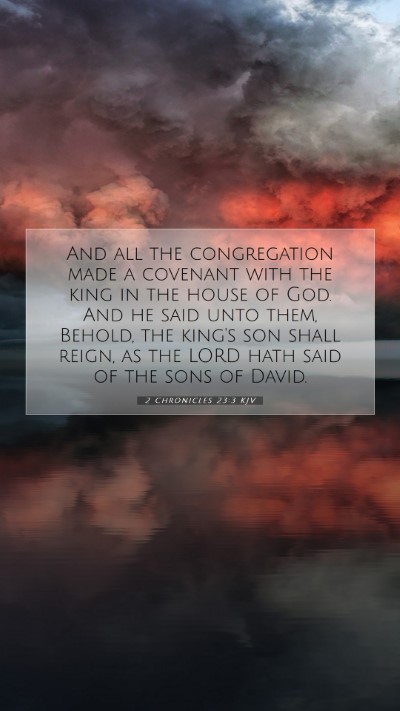Understanding 2 Chronicles 23:3: A Collaborative Commentary
Verse Reference: 2 Chronicles 23:3
"And all the congregation made a covenant with the king in the house of God. And he said unto them, Behold, the king's son shall reign, as the Lord hath said of the sons of David."
Introduction to the Verse
2 Chronicles 23:3 plays a crucial role in the narrative of the establishment of King Joash's reign. This passage is pivotal as it marks a covenant made between the people and the throne, reaffirming God's promises concerning the lineage of David.
Bible Verse Meanings: Insights from Public Domain Commentaries
Historical Context
The historical backdrop of this verse is significant. After the destructive reign of Queen Athaliah, who sought to eliminate the royal lineage, the people of Judah were desperate for restoration and divine order. The covenant made in this chapter signifies not only a political alignment but also a spiritual renewal centered on acknowledging God’s sovereignty.
Albert Barnes’ Commentary
Barnes emphasizes the importance of the congregation's covenant with Joash, indicating that it was not merely a political move but a commitment to uphold God’s will. This communal agreement re-establishes the Davidic line, which God had promised would never lack a ruler.
Matthew Henry’s Commentary
Henry highlights that this covenant was instigated by the faithful leaders of the Levites and priests who recognized a profound spiritual obligation to restore the rightful king anointed by God. He further points out how this illustrates the collective responsibility of the people in acknowledging God’s chosen leadership.
Adam Clarke’s Commentary
Clarke provides a detailed view on the mechanics of this coronation, noting how the people’s participation signifies their acceptance and dedication to God’s plan. He stresses the necessity of acknowledging the authority of God through the Davidic line, particularly in light of previous apostasy under Athaliah.
Theological Significance
This verse exemplifies several key theological principles:
- Covenant Unity: The act of covenanting reflects communal faith and obedience to God’s law.
- Divine Providence: The survival of Joash signifies God’s provision even amidst attempts to extinguish His promises.
- Leadership Under God: The acknowledgment that kingship derives from divine endorsement challenges us to consider the nature of our own governance.
Application for Today
For contemporary readers, 2 Chronicles 23:3 provides lessons on:
- Understanding Scripture: Recognizing the significance of divine covenants and their implications for leadership within our communities.
- Group Responsibility: Just as the people of Judah took a stand, modern believers are called to unify in faith and commitment to God’s purposes.
- Covenantal Relationships: Reflecting on how our commitments and covenants shape our spiritual journeys and communal lives.
Cross References
This verse resonates with several other Biblical passages, including:
- 2 Samuel 7:12-13: God's promise to David regarding his lineage and everlasting throne.
- 1 Kings 11:36: The continuity of David's line as a focal point of God’s plans for Israel.
- 2 Chronicles 21:7: God's faithfulness despite Israel's unfaithfulness.
Conclusion
In summary, 2 Chronicles 23:3 serves as a powerful reminder of God's faithfulness through covenants, the importance of collective commitment to divine principles, and the role of God in establishing rightful leadership among His people. This verse continues to challenge us to explore the depths of biblical exegesis and apply its teachings in our daily lives.


